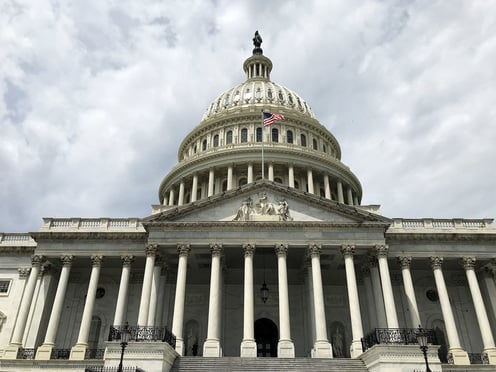Five Things GCs Can Expect From the New Congress
Democrats won the majority in the U.S. House of Representatives for the first time in eight years, but Republicans still control the Senate. Lawyers at Skadden and Fisher Phillips wrote about what companies (and their GCs) might anticipate from the new Congress in January.
November 08, 2018 at 06:17 PM
5 minute read
 U.S. Capitol, Washington, D.C. (Photo: Diego M. Radzinschi/ALM)
U.S. Capitol, Washington, D.C. (Photo: Diego M. Radzinschi/ALM)
For the first time in eight years, Democrats hold a majority in the U.S. House of Representatives after the midterm elections, but any of their bills coming out of the House could stall in the still Republican-controlled Senate. On Wednesday , Margaret E. Krawiec, David B. Leland and Ivan A. Schlager, attorneys at Skadden, Arps, Slate, Meagher & Flom published a blog post on how the Democratic House majority could dramatically change priorities for congressional oversight investigations and other activities that impact companies.
Benjamin Ebbink, of counsel at Fisher & Phillips in Sacramento, and Richard Meneghello, a partner at the firm in Portland, Oregon, also co-authored a report on what employers can expect with the new Congress in 2019 with respect to labor and employment laws.
Below are some key takeaways based on both reports.
- Immigration reform will most likely remain at a stalemate. Ebbink wrote that, despite immigration being a hot-button issue, he doesn't think reform bills will pass both houses. “There isn't much in terms of reform that folks should be anticipating,” Ebbink wrote. He said, despite immigration being important to industries such as agriculture, he wouldn't expect much to happen. Even if immigration reform passes in the House, it would most likely stall in the Senate, he said.
- If any employment-related bill is going to make it to the president's desk, it could be paid leave. Ebbink and Meneghello wrote in the Fisher Phillip's post that paid family leave has support from both sides of the aisle. “There are a lot of people talking about paid family leave,” Ebbink said in a phone interview. “That could potentially be one area where there is some discussion.” Ebbink said there has been support for paid family leave from everyone including President Donald Trump. In his post on the Fisher Phillips website, he said that some Republicans in the House and Senate have floated the idea of such a program. In August, Sen. Marco Rubio, R-Florida, introduced a bill to allow new parents to draw early Social Security benefits for paid leave. That bill, however, has already received criticism from the left, according to Politico, and would most likely not be supported by Democrats in the House. “At least some in both parties have expressed a desire for a paid family leave law,” David Schwartz, a partner at Skadden's labor and employment group in New York said in an email. “However, the proposals to date take vastly different views on how to fund the leave, and a law on this topic coming out of the new Congress may be unlikely.”
- The fate of the Affordable Care Act is still pending. Despite not being able to get rid of so-called Obamacare when Republicans controlled both legislative houses, the ACA could still be undone at least in part. The Fisher Phillips post states that Texas v. Azar, in the U.S. District Court for the Northern District of Texas, will likely be decided soon. Whatever, the ruling, the post says, the case will likely end up in the U.S. Court of Appeals for the Fifth Circuit, and then it could end up yet again before he U.S. Supreme Court. In September, Judge Reed O'Connor of the U.S. District Court for the the Northern District of Texas heard oral arguments over the ACA, according to The Los Angeles Times and questioned the attorneys involved on which provisions of the ACA should stand.
- The Trump tax cuts could be called into question. With a majority of Democrats in the house, the Trump tax cuts would most likely be called into question, according to the Skadden post. The Trump administration lowered the corporate tax rate from 35 percent to 21 percent. President Trump also has indicated in the past that he wants to cut the corporate tax rate even more in the future. “As part of their efforts, Democrats may turn to corporations for documents and information and set public hearings where CEOs are called to testify and disclose the amounts saved as a result of such tax cuts,” the Skadden post says.
- With a Democratic majority in the House, expect more requests for reports from the Government Accountability Office. Democrats may continue to make frequent use of the GAO to investigate not only Trump himself but also certain industries, according to the Skadden report. Because of the expected uptick in GAO reports that could lead to investigations, companies should take steps to prepare for such investigations, even if those inquiries are industrywide and not specific to a particular company. “A company might assess whether to proactively make changes to policies, procedures or business practices that might address Democratic concerns, as Congress frequently has used these investigations to force industry wide changes,” according to the post.
Also Read: Employment Law Implications After U.S. House Flips to Dems
After Midterms, Lawyers and Lobbyists Look for Opportunities in Divided Government
This content has been archived. It is available through our partners, LexisNexis® and Bloomberg Law.
To view this content, please continue to their sites.
Not a Lexis Subscriber?
Subscribe Now
Not a Bloomberg Law Subscriber?
Subscribe Now
NOT FOR REPRINT
© 2025 ALM Global, LLC, All Rights Reserved. Request academic re-use from www.copyright.com. All other uses, submit a request to [email protected]. For more information visit Asset & Logo Licensing.
You Might Like
View All
Trump Fires EEOC Commissioners, Kneecapping Democrat-Controlled Civil Rights Agency

Testing Legal Authority, Trump Fires NLRB Member, Leaving Panel Without Quorum
3 minute read

Trending Stories
- 1States Accuse Trump of Thwarting Court's Funding Restoration Order
- 2Microsoft Becomes Latest Tech Company to Face Claims of Stealing Marketing Commissions From Influencers
- 3Coral Gables Attorney Busted for Stalking Lawyer
- 4Trump's DOJ Delays Releasing Jan. 6 FBI Agents List Under Consent Order
- 5Securities Report Says That 2024 Settlements Passed a Total of $5.2B
Who Got The Work
J. Brugh Lower of Gibbons has entered an appearance for industrial equipment supplier Devco Corporation in a pending trademark infringement lawsuit. The suit, accusing the defendant of selling knock-off Graco products, was filed Dec. 18 in New Jersey District Court by Rivkin Radler on behalf of Graco Inc. and Graco Minnesota. The case, assigned to U.S. District Judge Zahid N. Quraishi, is 3:24-cv-11294, Graco Inc. et al v. Devco Corporation.
Who Got The Work
Rebecca Maller-Stein and Kent A. Yalowitz of Arnold & Porter Kaye Scholer have entered their appearances for Hanaco Venture Capital and its executives, Lior Prosor and David Frankel, in a pending securities lawsuit. The action, filed on Dec. 24 in New York Southern District Court by Zell, Aron & Co. on behalf of Goldeneye Advisors, accuses the defendants of negligently and fraudulently managing the plaintiff's $1 million investment. The case, assigned to U.S. District Judge Vernon S. Broderick, is 1:24-cv-09918, Goldeneye Advisors, LLC v. Hanaco Venture Capital, Ltd. et al.
Who Got The Work
Attorneys from A&O Shearman has stepped in as defense counsel for Toronto-Dominion Bank and other defendants in a pending securities class action. The suit, filed Dec. 11 in New York Southern District Court by Bleichmar Fonti & Auld, accuses the defendants of concealing the bank's 'pervasive' deficiencies in regards to its compliance with the Bank Secrecy Act and the quality of its anti-money laundering controls. The case, assigned to U.S. District Judge Arun Subramanian, is 1:24-cv-09445, Gonzalez v. The Toronto-Dominion Bank et al.
Who Got The Work
Crown Castle International, a Pennsylvania company providing shared communications infrastructure, has turned to Luke D. Wolf of Gordon Rees Scully Mansukhani to fend off a pending breach-of-contract lawsuit. The court action, filed Nov. 25 in Michigan Eastern District Court by Hooper Hathaway PC on behalf of The Town Residences LLC, accuses Crown Castle of failing to transfer approximately $30,000 in utility payments from T-Mobile in breach of a roof-top lease and assignment agreement. The case, assigned to U.S. District Judge Susan K. Declercq, is 2:24-cv-13131, The Town Residences LLC v. T-Mobile US, Inc. et al.
Who Got The Work
Wilfred P. Coronato and Daniel M. Schwartz of McCarter & English have stepped in as defense counsel to Electrolux Home Products Inc. in a pending product liability lawsuit. The court action, filed Nov. 26 in New York Eastern District Court by Poulos Lopiccolo PC and Nagel Rice LLP on behalf of David Stern, alleges that the defendant's refrigerators’ drawers and shelving repeatedly break and fall apart within months after purchase. The case, assigned to U.S. District Judge Joan M. Azrack, is 2:24-cv-08204, Stern v. Electrolux Home Products, Inc.
Featured Firms
Law Offices of Gary Martin Hays & Associates, P.C.
(470) 294-1674
Law Offices of Mark E. Salomone
(857) 444-6468
Smith & Hassler
(713) 739-1250






